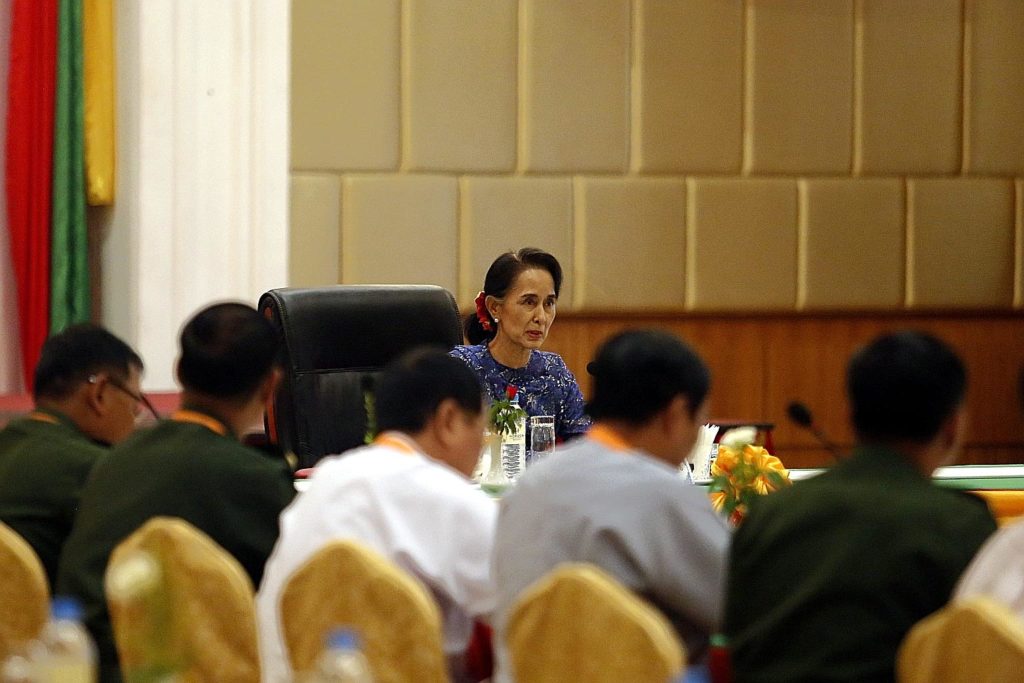Dilemma for [Nobel Peace Laureate] Suu Kyi in Push for Peace Process in Burma/Myanmar
NOBEL LAUREATES, 2 May 2016
Nirmal Ghosh – The Straits Times
T ough task ahead despite public support as backing of military is needed, say observers.
ough task ahead despite public support as backing of military is needed, say observers.
29 Apr 2016 – Myanmar’s de facto leader Aung San Suu Kyi has called for a major peace conference with ethnic minorities – a chance again for Myanmar to progress towards the federal state the minorities have fought for decades.
But analysts warn that despite her public support – her National League for Democracy (NLD) won the November 2015 election by a landslide – the military must be on the same page for any effort to succeed.
The leader of the NLD government told representatives of armed ethnic groups on Wednesday: “We have to work on holding a peace conference and including non-signatories of the NCA in the peace process at the same time.” The NCA is the National Ceasefire Accord that was cobbled together last October by the previous government with eight armed groups. Several other armed groups did not sign the pact.
Ms Suu Kyi was speaking at a meeting with the Joint Monitoring Committee set up to monitor the NCA.
The NLD government’s moves will be closely watched as an indicator of the direction of historically fractious relations between the Burman majority and the armed ethnic minorities.

Ms Suu Kyi addressing the committee that monitors the National Ceasefire Accord on Wednesday. PHOTO: EUROPEAN PRESSPHOTO AGENCY
“The signal is that she will continue the previous process, but put her own stamp on it,” Yangon-based Richard Horsey, an independent analyst and former top UN official in the country, wrote in an e-mail. “She has a number of advantages over the previous government: much more trust and popular support, including in ethnic areas, as well as political legitimacy… but there are many potential pitfalls.”
Separately, UK-based Myanmar academic and activist Maung Zarni, a researcher attached to Cambodia’s Sleuk Rith Institute, was pessimistic. “The military doesn’t trust or respect (Ms Suu Kyi) despite her overwhelming public support at home and global stature abroad,” he wrote in an e-mail. “They will not let her have the honour of being the lady who delivered peace on a platter after nearly 70 years of its absence.”
In the months since the election, the peace process has been adrift. Until Wednesday, there was little initiative from the incoming government, and in the meantime, there have been frequent clashes between the Tatmadaw – the army – and rebels.
A new phrase has emerged to describe a clutch of armed groups operating close to or on Myanmar’s border with China – the Northern Alliance. This alliance includes the Kokang, the Ta’ang National Liberation Army, the United Wa State Army and the Kachin Independence Army. None of them signed the NCA.
In another dimension to the so-called Northern Alliance, a re-emerged Arakan Army with troops who have trained in Kachin state has been skirmishing for months with the Tatmadaw, and on April 16 killed a Myanmar army battalion commander and several soldiers.
It is difficult, said one analyst who spoke to The Straits Times on condition of anonymity, to see Ms Suu Kyi delivering peace with major concessions to the armed groups as that would offend her Burmese support base, not to speak of the army.
Speaking to The Straits Times, Colonel San Aung, former military operations chief of a Karen armed group which signed the NCA, said: “She has a duty to clean up all the mess made in the past.”
But not all ethnic groups were going to get what they want, he cautioned – not least because the 2008 Constitution does not give Ms Suu Kyi full authority.
The junta-era Constitution has a clause that bars Ms Suu Kyi from the presidency. It also guarantees the army 25 per cent of Parliament and state assembly seats, and control of three key ministries – home, defence and border affairs.
__________________________________
Nirmal is a senior correspondent and Indochina bureau chief for The Straits Times, based in Bangkok. He was President of the Foreign Correspondents Club of the Philippines in 1998-99, and of the Foreign Correspondents Club of Thailand in 2008 and 2012. He is also a published author and filmmaker and is deeply involved in wildlife conservation issues.
A version of this article appeared in the print edition of The Straits Times on April 29, 2016, with the headline ‘Dilemma for Suu Kyi in push for peace process’
Go to Original – straitstimes.com
DISCLAIMER: The statements, views and opinions expressed in pieces republished here are solely those of the authors and do not necessarily represent those of TMS. In accordance with title 17 U.S.C. section 107, this material is distributed without profit to those who have expressed a prior interest in receiving the included information for research and educational purposes. TMS has no affiliation whatsoever with the originator of this article nor is TMS endorsed or sponsored by the originator. “GO TO ORIGINAL” links are provided as a convenience to our readers and allow for verification of authenticity. However, as originating pages are often updated by their originating host sites, the versions posted may not match the versions our readers view when clicking the “GO TO ORIGINAL” links. This site contains copyrighted material the use of which has not always been specifically authorized by the copyright owner. We are making such material available in our efforts to advance understanding of environmental, political, human rights, economic, democracy, scientific, and social justice issues, etc. We believe this constitutes a ‘fair use’ of any such copyrighted material as provided for in section 107 of the US Copyright Law. In accordance with Title 17 U.S.C. Section 107, the material on this site is distributed without profit to those who have expressed a prior interest in receiving the included information for research and educational purposes. For more information go to: http://www.law.cornell.edu/uscode/17/107.shtml. If you wish to use copyrighted material from this site for purposes of your own that go beyond ‘fair use’, you must obtain permission from the copyright owner.
Congratulations to Aung San Suu Kyi for moving this peace conference forward. While it is true that there are hurdles ahead, this is one of the most hopeful initiative to bring about peace and incorporation with the ethnic nationalities who have been excluded from the Rangoon regime for too long. Let us not forget that there were also seemingly insurmountable odds to have the military release its grip around the throat of the government not very long ago. The movement for peace, equity, incorporation, and federalism is advanced through the continuing hope and willingness to advance the cause in face of seemingly insurmountable odds. Aung San Suu Kyi apparently understands this and trudges forward with a beautifully hopeful spirit.